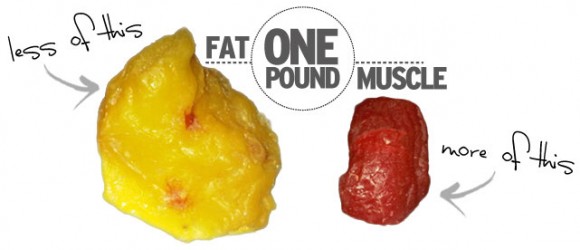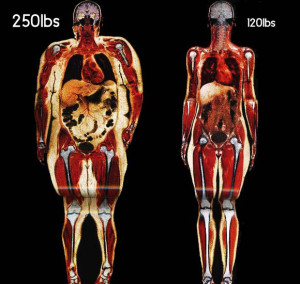More muscle, less fat…
I have the following conversation with people quite frequently:
Me: Tell me about your progress.
Them: I’ve lost 15 pounds!
Me: You have. That’s awesome! 15 pounds of what?
Them: (silence) … 15 pounds of… uhm, well, not sure exactly.
Far too many people care about losing weight. If you’re wondering “Should I weigh myself?” be my guest. But whatever that number is, it’s only data and nothing more. And for many people, it’s counter-productive to getting them to understand the following: FAT MATTERS, WEIGHT DOES NOT!
Let me repeat… Fat matters, weight does not! And that’s why more muscle, less fat is the goal!
The benefits of lean muscle mass can’t be overstated. Here are just some of the more muscle, less fat advantages to get you rethinking your fitness priorities.
More muscle, less fat advantage #1: Muscle burns more calories than fat.
A pound of muscle burns about six calories per day (whereas a pound of fat burns 1-2 calories per day). So if you work hard and add five pounds of muscle, you’ll burn an extra 30 calories a day… and that’s at rest. Who wouldn’t like to burn 30 more calories a day while doing nothing? Doesn’t sound like much… but that’s 210 calories a week… 10,920 a year. To burn a pound of fat it takes 3,500 calories. So over the course of a year, having this extra five pounds of muscle will allow you to burn the equivalent of over 3 pounds of fat (10,920 / 3,500 = 3.12). Not impressed? Read on.
More muscle, less fat advantage #2: More calories are burned during the workout.
So now with this extra five pounds of muscle, you’re getting the added benefit of burning more calories DURING your workout. It takes more calorie consumption for a fit body to workout with that extra muscle than an unfit body that has five pounds less muscle on it. How many more calories? Depends who you ask as the studies vary. But let’s be conservative and say it’s an extra 50 calories per workout. And you workout five days a week. That’s 250 extra calories a week… or 13,000 calories a year… the equivalent of close to 4 pounds of fat (13,000 / 3,500 = 3.71). So we’re up to the equivalent of seven pounds of fat burned. Got your attention yet? If not, you apparently haven’t seen this:

More muscle, less fat advantage #3: More calories are burned post-workout.
It is believed that high intensity strength training will also result in a greater number of calories burned after your workout. So after a strength training workout, we’re getting an extra dose of calories burned as compared to other forms of exercise. Remember advantage #1… that has just been multiplied!
These first three advantages are compounding each other and remind me of a quote from Benjamin Franklin regarding compound interest:
Money makes money. And the money money makes, makes more money.
Benjamin Franklin
So I want to take a cue from The First American and apply a fitness angle. Hopefully he won’t mind.
Muscle makes muscle… and burns calories. And the muscle muscle makes, makes more muscle…and burns even more calories.
Matthew Pryor
More muscle, less fat advantage #4: Stave off the fat gain that comes from aging.

As we age, we naturally put on weight. In fact, starting in their mid-20s, women can put on 5% of their body weight each decade from 25 to 45. But with extra muscle eating up those extra calories, you can prevent this from happening. For how long? Well, at the ripe young age of 82, Barbara Eden (yes, that Barbara Eden, of “I Dream of Jeannie” fame”) said in an interview that in addition to spinning, she LIFTS WEIGHTS!
More muscle, less fat advantage #5: Stave off impending muscle loss that comes from aging.
After the age of 25, we can lose .5-1% of our muscle mass PER YEAR if we live a sedentary lifestyle thanks to sarcopenia. Obviously, if we’re strength training, this won’t happen (SEE BARBARA EDEN). And if we start with a higher amount of lean mass to begin with, the longer it would take to lose it if we did become sedentary…which isn’t gonna happen, right? RIGHT!?
More muscle, less fat advantage #6: Take up less space.
When you strength train, you’ll create changes in your body composition, which help shape your body. Assuming you’ve lost fat along with adding muscle, you’re going to take up less space because there’s less volume to your body. Notice how small that pound of muscle is in the picture above? It’s almost 1/3 the size of that pound of fat. Replacing the fat on our bodies with that muscle will just make us smaller… stronger and smaller! What’s not to like?
More muscle, less fat advantage #7: Stronger is safer.
An inherent advantage to being stronger is you’re less prone to injury. The extra muscle acts as a sort of shock absorber in our body, which helps keep us safer. We have less imbalances in our musculature which also helps prevent injury and improves coordination. And it strengthens our bones and connective tissue as well.
More muscle, less fat advantage #8: Stronger is healthier.

The best reason to have more muscles and less fat is that it’s just all around healthier for our bodies (injury aside). Take a look at this diagram of a 250 pound woman vs. a 120 pound woman. Notice the stress on the organs? The lungs are crushed. The heart is swollen. Colon is bulging. Let alone the stress it’s placing on the joints. Hard to be happy when we’re unhealthy.
More muscle, less fat: Conclusion
While there’s nothing wrong with wanting to look better, our primary goal is to be healthier. But adding more muscle and having less fat helps with both things! So if your scale is playing mind games with you, working against the goal of adding muscle, throw it away!
And then reorient your thinking towards improved health! You see, when we are healthy, we can give so much more to those around us, and that’s the greatest advantage of them all.



0 Comments